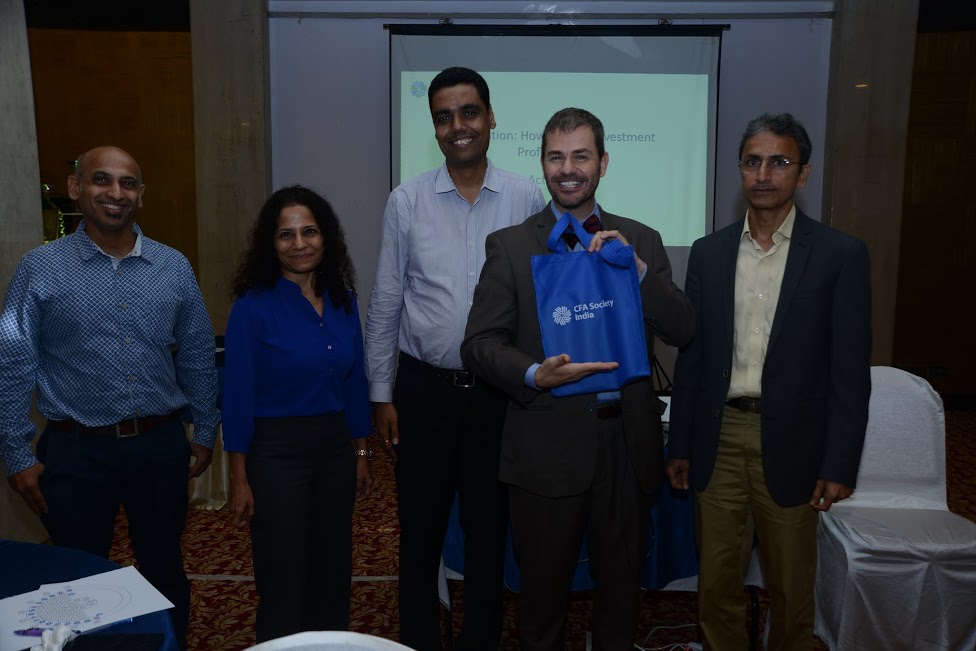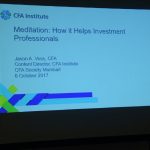- October 22, 2017
- Posted by: annlin@india.cfasociety.org
- Category:Bengaluru, BLOG, Chennai, Events, Mumbai, New Delhi, Speaker Events
Contributor: Shivani Chopra, CFA

The moment we hear the word meditation, the next closest word that comes to our mind is probably ‘Yoga’! Yogis have been practicing meditation for over a millennium and while we do understand that meditation is an important facet of yoga, how does it help investment professionals? Is the discussion branching out of behaviour finance or is it a new phenomenon altogether? To answer these and many other questions, four chapters of CFA Society India- Mumbai, Delhi, Bengaluru and Chennai organised a speaker event with Jason A Voss, CFA during 6-8 Oct, 2017. Jason is the content director at CFA Institute and author of the book- The Intuitive Investor.
Jason began the discussion by taking a few famous names who regularly meditates/meditated. The list includes people – Steve Jobs (Apple) and Marc Benioff (Saleforce.com), organizations – AOL Time Warner and Google, business schools – Georgetown University and New York University. In the investing world, there are people such as Ray Dalio (Bridgewater Associates) and organizations like Blackrock, Deutsche Bank, Goldman Sachs, etc who practice meditation. Unlike in India, in developed countries of US and UK, meditation is still a controversial topic. The product got developed due to its advantage as 59% of members in a 2014 Annual Member survey wanted the institute to develop a program and listed better thinking and stress relief as the top reasons.
After an initial background, a few fictions were mentioned-
- Fiction #1 – “It is for shaven-headed cave dwellers” but the reality is that meditation states are innate to human consciousness and helps us to understand functioning of our minds
- Fiction #2 – “There is only one way to meditate” but the reality is that there are thousands of ways to meditate and 4-5 have evolved as major practices
- Fiction #3- “It is hard to do” but the reality is it all depends upon You!
Above all the hard core reality is that while there are thousands of pieces of content offered by CFA Institute, only meditation can improve the quality of our mind and hence improve our understanding of all the readings and articles. Jason then initiated the first activity of the session. He asked the attendees to either colour a sheet or walk around the hall. After the activity was over, he shared how these unifying experiences in everyday life connect to meditation.
Investment professionals face daily obstacles relating to stress, better thinking, overcoming behavioural bias and ethical dilemmas. According to a survey, 80% of the workers feel stress on the job and nearly 50% say they need help to manage stress. There is also intense competition in the industry that requires professionals to outthink their competitors. Another challenging stress is overcoming behavioural biases like loss aversion, overconfidence, confirmation, mental accounting, etc. These biases are hardwired and so difficult to overcome. Ethical dilemmas can stem from three sides- client, firm and personal. They may not always coincide. The participants then delved deeper into understanding how meditation can relieve these daily challenges. There is an overwhelming scientific evidence that supports the case of meditation as it provides physical benefits, improves memory, overcomes decision making biases and develops emotional intelligence. Studies started 100 years ago when hippies came to countries like India and Bhutan and conducted research once back to their home countries. Today there are over 30,000 scientific studies and Jason talked about the most popular ones in detail. Evidence suggests that meditators can also live longer/younger and become more creative.
The event wrapped up with the most awaited activity- learning how to meditate. Jason helped everyone practice the major styles of meditation-
- Focused awareness: Focuses on breath- inhalation, exhalation
- Open monitoring : Focuses on areas other than breath like sound
- Compassion: Involves thinking about of relationship with oneself, a loved one or colleague etc.
- Visualization: Involves imagining to be stronger, more active, getting less tired, etc.
-SC


































